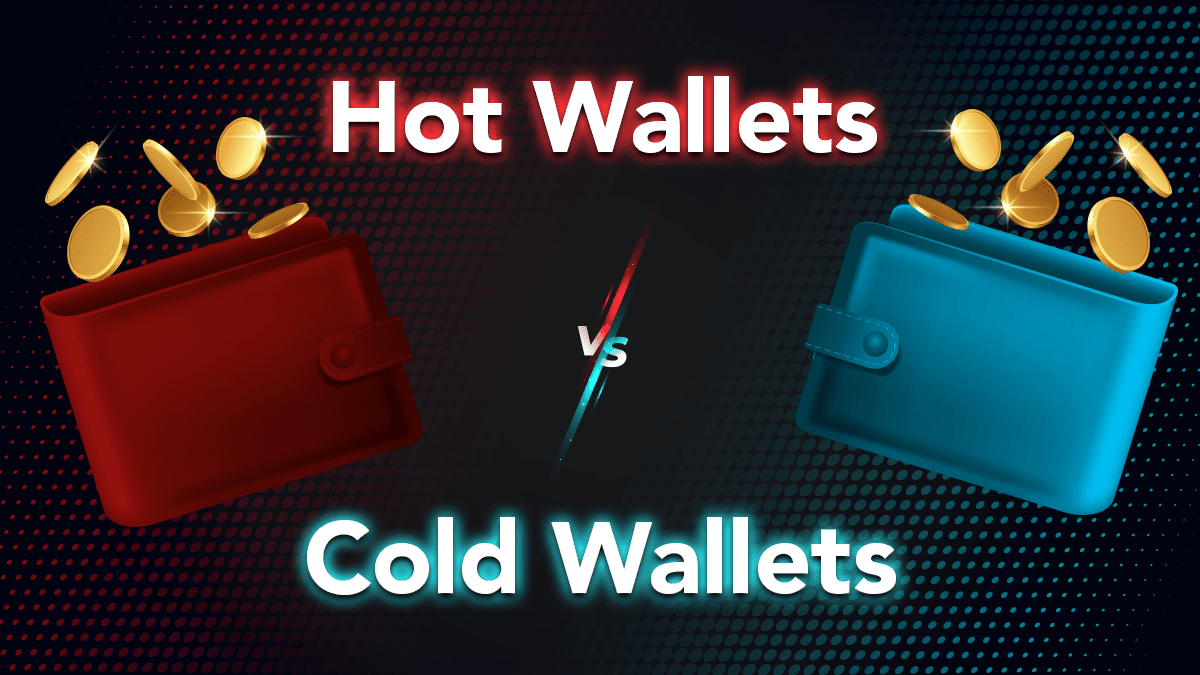To acquire digital assets, you must understand how and where to store them safely. This is not a choice but a necessity. Unlike traditional cash currencies, cryptocurrencies are independent and live on a blockchain. Therefore, you need a secure way to store them called a wallet. These secure wallets allow you to access your cryptocurrency assets with a pair of keys – public and private.
In cryptocurrency, the public key is used to send and receive digital assets. In contrast, the private key is used to verify transactions and confirm ownership of the cryptocurrency wallet. In cryptography, the public key is similar to a bank account number, and the private key is identical to a personal identification number (PIN). The main difference between hot and cold wallets is how private keys are stored. Hot wallets store private keys online, while cold wallets store them offline.
In this article, we’ll look at the current debate about hot and cold wallets, what to think about when choosing a wallet, and how to strategically use both hot and cold wallets to manage your cryptocurrency portfolio best.
What Does “Hot Wallet” Mean?
A hot wallet is an online version of a digital wallet that secures both public and private crypto keys. The platform can be accessed from any device connected to the Internet, such as a computer or smartphone. Hot wallets are convenient for regular use because you don’t always have to plug and unplug them. All you need is an Internet connection. Most crypto software solutions can be downloaded and used for free and have an easy-to-use interface that makes it easy for all users.
Security breaches are likely because public and private keys are stored online in hot wallets. This exposes users to the risk of hacking and other forgeries.
Types of Hot Wallets
Regarding digital assets, there are two types of hot wallets: exchange-based and software-based ones that do not store digital assets. The first method involves creating an account on a controlled exchange, which ensures the safety of the user’s money. The second involves software-based hot wallets that do not need a custodian.
Exchange-Based Wallets
Exchange-linked wallets are an integral part of a controlled exchange. Centralized exchanges act as custodians because they hold the secret keys to their users’ addresses. The firm store’s assets on private financial platforms in hot and cold wallets. This means that the client must have complete control over the assets.
Unfortunately, this exposes users to the risk that the exchange will take steps that will result in the loss of their assets, as the FTX event in November 2022 demonstrated. In the future, the cryptocurrency community wants Proof of Reserves to be used to make security companies more transparent and more accountable for the tokens they store for their customers.
Despite the decline of centralized exchanges, exchange wallets are still popular, especially among smaller users, because they make transferring money to and from Bitcoin easy. Exchange customer service can help you access your wallet if you need help finding your login information.
Hot Wallets for Non-custodial Software
Non-custodial software does not need a third party to store or process assets. Hot wallets can be used on multiple devices, such as mobile, browser-based, and PC applications. More often than not, they work with other chains. As for these hot wallets, users are responsible for keeping their secret keys safe and completely controlling their funds. Although unsecured storage keeps your money safe during a bank theft, if you lose your starting phrase, you will no longer be able to access your wallet or the cryptocurrency it contains.
What Does “Cold Wallet” Mean?
A hardware wallet, also called a “cold wallet,” is a physical device that securely stores your secret keys when you are not online. Most often, such a gadget costs between $50 and $250. Cold wallets are the safest thing to have when it comes to coin purses. They cannot be attacked online because they are offline. This makes it very unlikely that hackers will gain unwanted access to your secret keys and hardware wallet.
Hardware wallets are physical encryption tools like USB flash drives or hard drives. They work because your passwords, PINs, and secret keys are stored on the hardware device. A cold wallet cannot be hacked even if malware exists because its private keys are held securely in a standalone chip. If your computer or online wallet security is compromised, your digital assets remain safe unless the person who committed it gains access to your device and PIN.
Because of how cold wallets are made, they can be lost if handled carelessly. You can use a starter word to regain your private keys if you lose or have your cryptocurrency hardware wallet stolen. It would help if you kept your starter words offline and on paper to keep them as secure as possible.
Because they have better security features and can store coins offline, cold wallets are a better option for long-term Bitcoin storage than active trading.
Choosing a Wallet: What to Think about
Security
The security features of a cryptocurrency wallet are the essential thing to consider when choosing one. The wallet should have top-notch security features because blockchain technology is secure and cannot be altered. Cold wallets are safer than hot wallets because they are not online. This means that cyber risks such as phishing, hacking, and fraud, common in the online environment, cannot happen. Ensure your wallet is equipped with a two-factor authentication (2FA) tool so that your digital assets cannot be accessed without your permission.
Convenience
Because cold wallets don’t work online, they require real devices and online accounts to exchange funds with a key. On the other hand, hot wallets exist in the digital world, making them more convenient for everyday tasks such as daily cryptocurrency exchange.
Fees for additional transactions
Regardless of the card used, gas fees are always part of the transaction process. Exchange wallets may charge additional fees based on how much gas costs. However, this fee may be waived if you own your coin or quote it on an exchange. Before you buy or download a wallet, carefully examine how much they charge for their services.
Coins Accepted
It is essential to ensure that the wallet you choose is suitable for the cryptocurrency you want to invest in, as some wallets may not work with the coin you wish. It’s important to remember that some wallets can only work with one currency. Let’s think of Mycelium fungus, shall we? Even though it has many great features, you can only use Bitcoin with it. Before using a wallet, check the list of supported coins and tokens to avoid disappointment.
Managing your cryptocurrency portfolio with hot and cold wallets
Although cold wallets are more secure, hot wallets are easier to use for day-to-day activities. On the other hand, compared to hot wallets, cold wallets provide a higher level of security. Both applications support a large number of cryptocurrencies. So, choosing the best wallet depends on whether someone values the safety of their assets more than the convenience of frequent access to their wallet.
One can get the best of both by combining the two. As a prudent crypto trader, you should keep only a tiny portion of your money in a hot wallet for trades. Your remaining money should be kept in a cold wallet for long-term storage.


